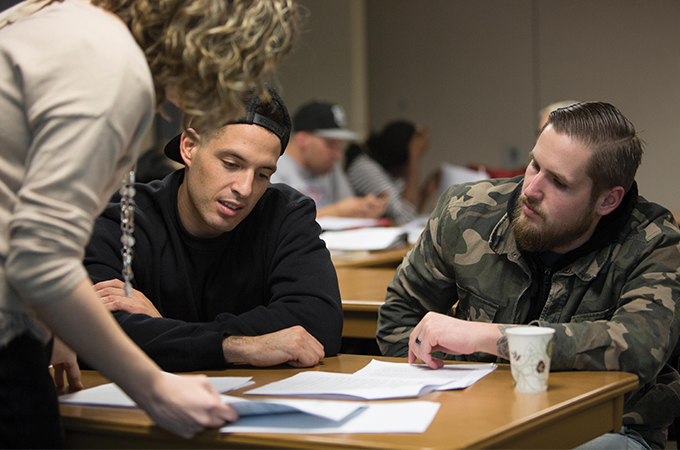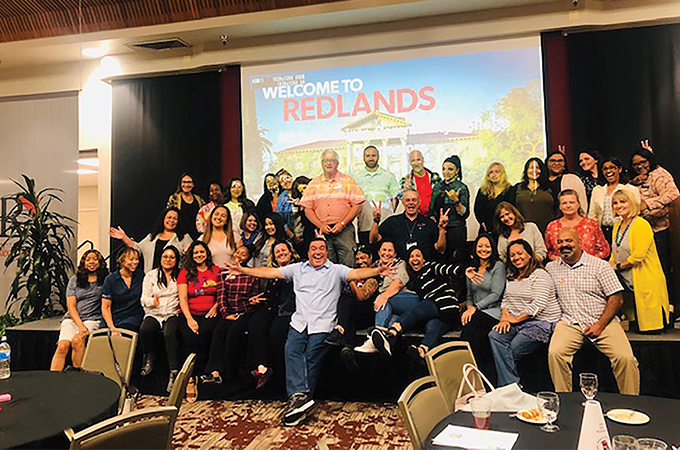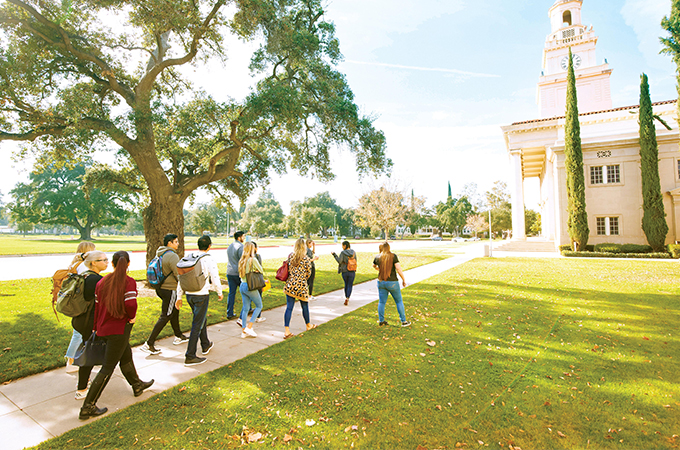In most universities, Orientation Week marks first-year students’ formal welcome; it’s a time to navigate new surroundings, meet lifelong friends, and connect with faculty members.
These activities have traditionally been tailored to students fresh out of high school, which wasn’t ideal for everyone at the University of Redlands, according to Amber Arguello ’15, ’20, graduate assistant coordinator of the Transfer Student Success team. She notes, “Transfer students can experience some of the hardest transitions to a new campus, a new community, and a new academic journey.”
As more students are considering community college to start their journeys to a four-year degree, in 2017 the University recognized it was time to revisit how it was supporting this population.
“This was an opportunity for us to be intentional and conscientious about how we serve our transfer students,” says Ken Grcich, senior associate dean of student affairs, “and to understand their needs so we could prioritize services.”
Today, staff from Student Affairs and the College of Arts and Sciences (CAS) work together to develop a path that offers both academic and social support for College transfer students. These students not only have distinct academic profiles, but also tend to be slightly older with more work and family responsibilities than the typical undergraduate.
In parallel, the School of Business has been building new opportunities for transfer students who are looking for options outside of the traditional residential college experience. Nancy Svenson, associate vice president for graduate and professional enrollment, notes accelerated programs with classes offered during the evening hours appeal to nontraditional students, whether they’re working professionals—“who have launched careers but never quite got around to finishing their bachelor’s degrees”—or transfer students looking for quality programming with the flexibility of evening and online classes, as well as the convenience of regional campuses and other classroom sites throughout California.
Raising awareness
In the College, Associate Director of Transfer Admissions Kylie Mulder, Associate Dean of Student Engagement David Schrum, and Director of CAS Pathways Sara Falkenstien ’96, ’04, collaborate on pathways for transfer students. Mulder is also part of the Transfer Student Success Team, an initiative within Student Affairs, alongside Grcich and Arguello.
At the beginning of the process, Mulder raises awareness of the U of R and its programs within the 123 California community colleges and other institutions that generate transfer students. “We try to reach students by utilizing social media, but it’s most important to recognize prospective students’ busy schedules,“ she says. “That’s why we meet with students where it is convenient for them and talk about coursework and the transfer application process.”

Mulder stays active with transfer recruitment events at community colleges and visits campus transfer centers monthly. Agreements between U of R and institutions such as Crafton Hills College and the College of the Desert make transferring easier. These agreements come with incentives, including guaranteed admission into the undergraduate and graduate programs for those who qualify, scholarships, and preferential access to U of R housing, among other advantages.
“We want students to know that Redlands can be affordable and attainable,” Mulder says. “We also talk to students about the value of a personalized education at Redlands. When you transfer here, you are going to be among 18 other people raising their hands and engaging in dialogue and discussion with faculty.”
Schrum adds that U of R is popular with transfer students due to its small size, personalized education, and opportunities for hands-on mentorship, research, and experiential learning.
For some, another draw is opportunities the University offers to help students pursue a graduate degree. College undergraduates can take classes in the School of Education that count toward a teaching credential or in the Geographic Information Systems program that can be applied toward a graduate degree.
The School of Business also offers alumni a “Bulldog discount” for its MBA and Master of Science in Organizational Leadership programs.
Borderless campuses
As with the College, the School of Business aims to meet prospective students where they are to extol the merits of the U of R, including the value of a personalized education. Liz Villegas, campus director for the School of Business’s Redlands campus, says that means visits to community college transfer centers and spending one-on-one time with students to review transcripts.
“Sometimes a degree seems out of reach,” she says, “and sitting down with the enrollment team shows students how they can actually do this. We give them options on financial aid, review their transcripts, and give them information on class schedules. It makes a big difference. We really try to help students find their focus and career opportunities.”
This attention is especially useful for military veterans, who often come out of the service with multiple transcripts depending on where they’ve been deployed.
“We help prospective students figure out which units are transferable to the U of R,” Svenson says. “If students don’t have enough units for admission into the B.S. program, they can earn them through a preparatory program offered by the U of R School of Continuing Studies.”
The School of Business also raises awareness about its programming through partnerships, which currently total more than 400—including with community colleges, public agencies such as law enforcement and city government, and the U.S. Department of Veterans Affairs. These partnerships offer sizable tuition discounts to students, bringing a Redlands education into reach for those who may not otherwise have considered transferring to a private university.
Many of these partnerships are tailored to the needs of a specific group. For example, an agreement with Fullerton College enables students to attend classes on the Fullerton College campus and complete a School of Business undergraduate degree, as well as to enroll directly into the School’s MBA program. A partnership with Rockwell Collins Aerospace Systems (formerly United Technologies Corporation) brings U of R to its employees, with U of R professors traveling to the company’s sites in Riverside and San Diego to teach classes that employees attend after their shifts.

And School of Business students are not necessarily left out of all aspects of a traditional college experience. This year, six of U of R’s football players are earning their degrees at the School of Business. Villegas says, “When our coaches see a student who would be a great addition to the football team but may not fit the traditional model—they may be working or supporting a family—our coaches present them with the option of going to the School of Business.”
Connecting students to campus life
A key aim of the University’s Transfer Student Success Team is to help transfer students integrate into campus life after admission. To do so, the team—which has now provided mentorship and guidance to 70 percent of the College’s transfer student population since its inception—offers one-on-one guidance, hosts get-togethers, provides resources, and circulates information through social media and a weekly newsletter called Transfermation.
“The goal is to make them feel like they’re part of the University of Redlands and the campus community,” Grcich says.
Brittny Sellick ’21 is a recipient of the Laura Dangermond Endowed Scholarship awarded specifically to students transferring into U of R from Crafton Hills College. She says that sense of community prioritized by the University and the city of Redlands drew her to the institution: “It feels like everyone knows everyone, and you’re never alone.”
While her transition has not been without challenges, Sellick says her transfer student orientation helped her form friendships that will last through her time at the University.
Donors have also enabled staff from Student Affairs and the College of Arts and Sciences to develop programs for the transfer student population. Lead funding from the Patricia & Christopher Weil Family Foundation created the Transfer Bridge Program, which provides incoming transfer students with important information before they begin classes.
A gift from Priscilla Blake Draper ’61 and the Draper Family Foundation helped launch the Transfer Peer Mentor program, in which two peer mentors serve as the first point of contact for new transfer students, helping to coordinate with faculty and advisors and sharing information on financial aid, academic success resources, social activities, and community service opportunities.
A Transfer Support desk at Hunsaker University Center now serves as a spot for students to become familiar with campus resources. The team also hosts events such as Transfer Student Orientation; a Pi Day Celebration; and the Bear Paw experience, an overnight stay in a U of R cabin. Arguello says students who participated in Bear Paw connected strongly and developed a lasting support system.
She confirms U of R’s efforts make a big difference and could not have come at a better time. “I don’t see the number of transfer students coming to U of R dwindling,” she says. “I only see it increasing.”
Learn more about University of Redlands transfer programs.






